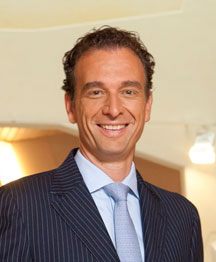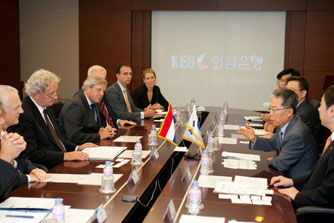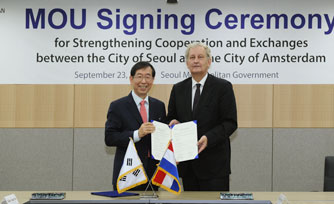“Creating long-term opportunities for businesses in Asia”

Jeroen Plag is responsible for large
international business customers of ING.
He represented ING on the trade
mission to Korea.
Jeroen Plag, head of International Corporate Clients at ING Commercial Banking, tells why ING is making a difference in Asia.
“We’ve got operations in 14 countries with our own offices on the ground,” Plag says, “where we’ve often had a presence for several decades. We know our customers, regulators and local investors. Most of our offices are staffed by local people, who’ve been with ING a long time and so who’ve known each other for a long time. That says something about the atmosphere at ING. And it leads to lasting relationships with each other and with our customers.”
“We do the groundwork ourselves, identify opportunities and put businesses in contact with one another. With our knowledge of projects, our expertise in structured export finance, including export credit insurance, and hedging exchange rate risks, we are then able to set up complex projects. Basically, with our network and our expertise, we fit the pieces together.”
Over the next ten years, Asia is set to offer a host of opportunities for Dutch businesses. Whereas only marginal growth is expected in the Netherlands and the rest of Europe over the next few years, the figures in emerging markets are more positive. In countries such as Mongolia, Indonesia and Vietnam, in particular, there are plenty of opportunities. Although Dutch companies already have operations in these countries, there is still plenty of scope for growth. This is true of large groups, but also of the SME sector.
With the expertise available in the various European offices, particularly in Amsterdam and London – and the Asian offices, ING is helping European companies that want to do business in Asia. But it is also helping large Asian companies – such as Hyundai and Mitsubishi – that want to set up projects in Central and Eastern Europe or in other Asian countries, for example.

The trade-mission delegation also visited the Seoul-based
Korea Exchange Bank. On the left, the Dutch delegation with
Amsterdam mayor Van der Laan in the middle, opposite of him,
on the right, president & CEO Yun Yong and a few
representatives of the Korea Exchange Bank.
High-profile financing
A good example of this is the high-profile USD 2.54 billion financing of a gas and petrochemical project in Uzbekistan (for more information, see spread 9). The project is being carried out via project company Uz-Kor Gas Chemical LLC, which is 50% owned by Uzbekistan’s national oil and gas company, Uzbekneftegaz, and 50% by a South Korean consortium comprising Honam Petrochemical Corp, Korea Gas Corporation and STX Energy Co Ltd.
Focus on sectors
In addition to a local presence and the combination of different forms of expertise, sector focus is one of ING’s strengths in Asia. The main focus is on utilities, oil and gas, such as offshore LNG platforms, cargo ships, refineries, metals and mining, raw materials, telecoms, infrastructure and transport, as well as all things supply-related.
ING has built up a strong position in the region in these areas. Plag: “For example, in the Philippines, ING has been involved in virtually every utilities-related transaction.” ING is always involved in large and long-term projects. “Basically, we’re helping to develop the national infrastructure in Asia. We’re not interested in the short-term and quick deals, but in long-term relationships that generate repeat business”, explains Plag.
“And we’re successful. I recently spoke to a Chinese businessman, who proudly announced that he had been an ING customer for 20 years!” An emerging sector at ING in Asia is agribusiness, particularly in Indonesia and Mongolia. “In Mongolia, there are huge opportunities, for example, in livestock breeding, which is still largely nomadic. In the extremely cold winters, 25% of the herd simply dies. There are plenty of opportunities to invest in modern technologies, with China and Russia as promising and expanding sales markets.”
Sustainability
When doing business in Asia, ING is of course guided by its own business principles, the Equator Principles, and its own Environmental and Social Risk policy (ESR) as part of its corporate social responsibility. Plag: “In the countries where we are operational, people are aware of our principles and policy and they respect them.
They are not an obstacle to doing business; in fact the opposite is true! It gives us an image of reliability. Of course, we encounter situations that require improvement; we don’t turn a blind eye. But there are very many positive developments. A country such as China, for example, is more engaged with the environment than you might think.”

From 21 to 28 September, mayor Van der Laan led a trade
mission to South Korea and China. In both countries, the
delegation visited Korean and Chinese companies that have
branches in the Amsterdam region. In Korea, a new joint
venture agreement was signed between the cities of Seoul and
Amsterdam. Seoul and Beijing have been twinned with
Amsterdam since 1999 and 1985 respectively.
In Seoul, Van der Laan (on the right) with his fellow
mayor Park (on the left) signed a new joint venture agreement.
Important themes in the agreement include: electric transport,
water, cycling and E-governance. There are currently around
50 Korean companies based in the Amsterdam region. Each year,
some five new Korean companies set up business. Members of the
Amsterdam delegation visiting Seoul included: the Amsterdam
Chamber of Commerce, NFIA, Schiphol, AKD, AON, Cisco, Deloitte,
ING, Drive Ugo, KIA motors, The Student Hotel and the
VU University Amsterdam.
Opportunities for Dutch businesses
One service in which ING is very strong in Europe is payments & cash management, but it is not a service that ING offers in Asia. Plag: “The large local banks with a multibranched national network can do a better job, but we’ve got excellent relationships with them, so it’s easy for us to make introductions for our customers.”
So far, most of ING’s customers in Asia have been large businesses. Smaller, specialist players with a global market are on the rise and for the time being, most of them are located in China and India. “But for Dutch companies, there are plenty of opportunities to be found”, explains Plag. He cites specifically a number of leading sectors: the ‘Internet of Things’ (this term refers to objects and products that exchange data with each other or with people, for example via sensors), agribusiness, water management, industrial suppliers, as well as luxury goods, such as clothing and luxury yachts.”
Exploring local customs
ING can also show companies entering the Asian market for the first time the ropes when it comes to the local way of doing business. Plag: “Asians really appreciate it if you take the trouble to find out about local customs. That’s important. For example, seating plans should be hierarchy-based. The most important person sits in the middle, the second most important person to his or her left, the next most important person to his or her right, and so on. This is also the order in which you introduce people. “
“Avoiding a loss of face is also vital, as is respect for authority and seniority. Added to this, people like to avoid conflict, they are polite and don’t engage in robust arguments. If you go for drinks with a client in the evening, or if you play a round of golf with a client, it’s all more informal. In these circumstances, it is not done to talk business.
Asians want to get to know you, to establish whether or not they can trust you. Once they have that trust, they believe ‘a man keeps his word’. This sometimes clashes with the Western tendency to put everything in black and white. But you can assume that an oral commitment will genuinely be honoured.”
The Netherlands has a lot to learn from Asian countries
“Indeed, we in the Netherlands can learn a lot from how the business community and public authorities create opportunities”, is Plag’s conviction. “Although we have the leading sector policy in the Netherlands, we approach things in too piecemeal a fashion. All kinds of businesses and agencies go it alone.”
“In countries such as China, Japan and Korea, they do everything together. This is how China is conquering Africa. For example, we need to be far more aware that a person such as the Mayor of Amsterdam, Van der Laan, enjoys significant status in Asian countries because of his position, even though in an informal country like ours, we’re more likely to call him by his first name, Eberhard. We could make better use of his status. That will also happen thanks to our Royal Family. And at ING, we’re happy to play our part of course,” Plag concluded.
